

The art of asking. Questions. 'Askers' vs. 'Guessers' - National. The Socratic Method. The Role of Questions in Teaching, Thinking and Le. One of the reasons that instructors tend to overemphasize "coverage" over "engaged thinking" is that they assume that answers can be taught separate from questions.
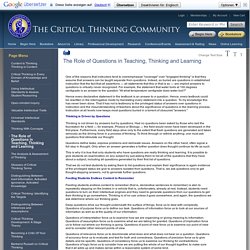
Indeed, so buried are questions in established instruction that the fact that all assertions — all statements that this or that is so — are implicit answers to questions is virtually never recognized. For example, the statement that water boils at 100 degrees centigrade is an answer to the question "At what temperature centigrade does water boil? " Hence every declarative statement in the textbook is an answer to a question. Resources « Sisyphean High: AP English Language & Composition. Questions no one knows the answers to (Full Version) - Chris Anderson.
For Students, Why the Question is More Important Than the Answer. Thinkstock In a traditional classroom, the teacher is the center of attention, the owner of knowledge and information.
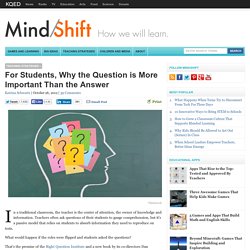
Teachers often ask questions of their students to gauge comprehension, but it’s a passive model that relies on students to absorb information they need to reproduce on tests. How to think like Sherlock Holmes: See and observe to fight attention blindness; be happier. Illustration by Rob Donnelly.
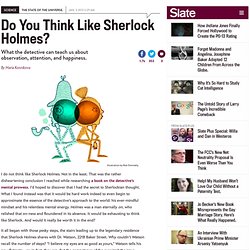
I do not think like Sherlock Holmes. One route: Start with a few interesting/inspiring sources. Noam Chomsky "Public Education and The Common Good" Noam Chomsky. Avram Noam Chomsky (born December 7, 1928) is an American linguist, philosopher, political activist, author, and lecturer.
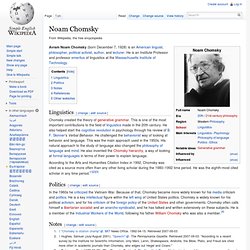
He is an Institute Professor and professor emeritus of linguistics at the Massachusetts Institute of Technology. Linguistics[change | edit source] Chomsky created the theory of generative grammar. How Media Shapes Perception. Chomsky Is Citation Champ. Many are the authors who may wonder if anyone is paying attention to what they write.
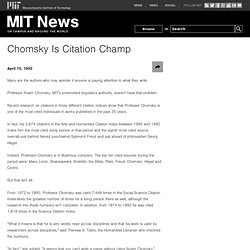
Professor Noam Chomsky, MIT's preeminent linguistics authority, doesn't have that problem. Recent research on citations in three different citation indices show that Professor Chomsky is one of the most cited individuals in works published in the past 20 years. In fact, his 3,874 citations in the Arts and Humanities Citation Index between 1980 and 1992 make him the most cited living person in that period and the eighth most cited source overrall--just behind famed psychiatrist Sigmund Freud and just ahead of philosopher Georg Hegel. Indeed, Professor Chomsky is in illustrious company. Lectures: Brenzel. The Essential Value of a Classic Education.
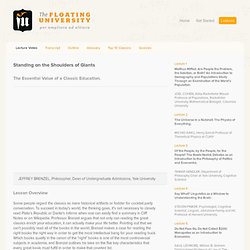
JEFFREY BRENZEL, Philosopher, Dean of Undergraduate Admissions, Yale University. New Research Tools Kick Up Dust in Archives. Seated recently in the special collections room at the Massachusetts Institute of Technology library, Anders Fernstedt raced through an imposing set of yellowing articles and correspondence.
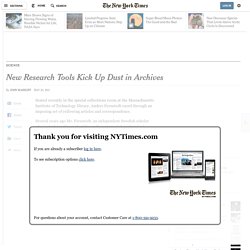
Several years ago Mr. Fernstedt, an independent Swedish scholar who is studying the work of the 20th-century philosopher Karl Popper and several of his colleagues, would have scratched out notes and set aside documents for photocopying. Now, however, his tool of choice is the high-resolution camera on his iPhone. When he found a document of interest, he quickly snapped a photo and instantly shared his discovery with a colleague working hundreds of miles away. Indeed, Mr. Interesting Research Approaches. Introducing “Freakonomics Experiments”: A New Marketplace Podcast.
RYSSDAL: Time now for a little Freakonomics Radio.

It’s that moment every couple of weeks we talk to the coauthors of the book and the blog of the same name. It is the hidden side of everything, of course. And today it is the brains if you will of the operation, Steven Levitt, professor of economics at the University of Chicago. Great to talk to you again. Freakonomics Experiments Preliminary Analysis.pdf. Read, I, Pencil. I, Pencil My Family Tree as told to Leonard E.
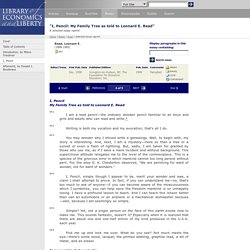
Read I am a lead pencil—the ordinary wooden pencil familiar to all boys and girls and adults who can read and write. . * Simon Rich: “Unprotected” I born in factory.
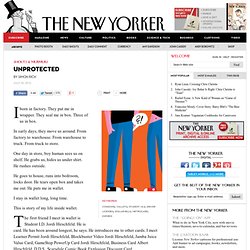
They put me in wrapper. They seal me in box. The Surprising History of the Pencil. By Maria Popova. Artisanal Pencil Sharpening. Microhistories of the Mundane: 10 Books About Everyday Stuff. This October, author Nicholas A. Technology Affordances. Lessness: Randomness, Consciousness and Meaning. Elizabeth Drew and Mads Haahr This paper was presented at the 4th International CAiiA-STAR Research Conference ‘Consciousness Reframed’ in Perth, Australia, 1-4 August 2002. A PDF version is also available. The tool described in the paper is still online but has been renamed Possible Lessnesses. Summary. How Brainless Slime Molds Redefine Intelligence [Video] Why the Brazil nuts are on top Phys. Rev. Lett. 58, 1038 (1987)
Physicist uses math to avoid traffic penalty. Applied Ethics in Agriculture Socy/Econ course syllabus and readings. Toothpaste in hotels: Why do they provide shampoo, soap, and high-end toiletries but no toothpaste? Dressing Constitutionally: Hierarchy, Sexuality, and Democracy from Our Hairstyles to Our Shoes: Introduction by Ruthann Robson. 3,000 Years of Human History, Described in One Set of Mathematical Equations. Does Expanding School Choice Increase Segregation? Architecture and Public Health: A NewPublicHealth Q&A with Brooks Rainwater. "THE REALITY OF FANTASY SPORTS: A METAPHYSICAL AND ETHICAL ANALYSIS" by Chad R. Carlson. Inspiration in Unlikely Places. Oscar-Winning Animated Short, The Dot and the Line, Celebrates Geometry and Hard Work (1965) The animated short above, The Dot and the Line, directed by the great Chuck Jones and narrated by English actor Robert Morley, won an Oscar in 1965 for Best Animated Short Film.
102 Spectacular Nonfiction Stories from 2012. Gangnam Style Flip Book Animation. How the Harlem Shake went from viral sideshow to global phenomenon. The Jenna Marbles Paradox: Why Are YouTube Videos So Terrible? Life in Five Seconds: Minimalist Pictogram Summaries of Pop Culture and Historical Events. The Myth of Pop Culture: Why "Highbrow" and "Lowbrow" Don't Work. Jay-Z's 99 problems close reading w 4th amendment for cops and perps. “New shit has come to light”: Information seeking behavior in The Big Lebowski. Academic paper on The Big Lebowski. Did You Say that Voting is Ridiculous?: Using South Park to Teach Public Choice by Adam J. Hoffer, George R. Crowley.
We Analyzed Keith Morris’s Dreadlock. Mozart had weird ears. Julian Rubinstein: The Hunt for Illegal Egg Collectors. Essay: Unexpected Insights into Terrorism and National Security Law Through Children's Literature: Reading the Butter Battle Book as Monstrosity by Nick J. Sciullo. Lol My Thesis. Why is Pizza Hut's roof like that? An Anthropological perspective on the Coca-Cola Company. Locating Zombies in the Sociology of Popular Culture. The 1980's Power Suit: Anger Dressed As Beauty. Thinking and Learning TED Ed. Language and Literature TED Ed. Critical Thinking On The Web. Creativity/Problem Solving/Criti. Resilience. Citelighter - The fully automated bibliography, research, citation, and internet highlighting tool.
Information Research. Research. S.O.S. for Information Literacy. Writing. Articles and essays. Extended Essay Guide. Example of EE. International Baccalaureate / Extended Essay Resources. IB Extended Essay Supports Success at U Va. Extended Essay Advice for Students in the IBO. Category:Research methods. Social Research Methods.
Research Methods. Research Methods. Research Methods in Psychology: Evaluating a World of Information: W. W. Norton StudySpace. Home - Research Guides at University of Miami. Content Analysis.